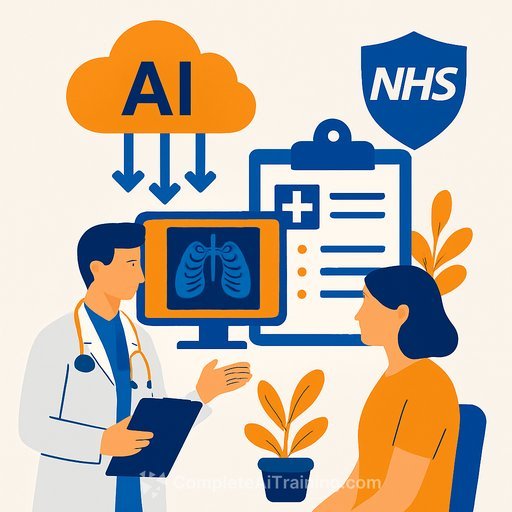Government moves to speed safe AI adoption across the NHS
NHS England is building a new AI research screening platform, AIR-SP, backed by nearly £6 million in government funding. The aim: allow every trust to join AI screening trials faster, at lower cost, and with consistent governance.
In parallel, a new national commission will advise regulators on a clear rulebook for AI in healthcare, due next year. Together, these steps focus on faster evidence generation and safer, simpler routes from trial to frontline use.
What AIR-SP is and why it matters
AIR-SP will be an NHS-wide cloud environment that hosts multiple AI tools with secure connections to all NHS trusts. This shared setup should remove repeated integration work and speed study start-up.
The platform will take two years to build and will enable simultaneous testing of tools across any trust. First priority: supporting an NIHR-funded breast screening study involving 700,000 women, identifying changes in breast tissue that may signal cancer and referring for further checks when needed.
"We hope that the introduction of this single shared system will make it both quicker and easier for trusts across the UK to test AI tools that could hold the potential to improve early detection and make the breast screening programme even more effective," said Simon Vincent, chief scientific officer at Breast Cancer Now.
New national commission and rulebook
The UK National Commission on the Regulation of AI in Healthcare will bring together experts from technology companies, clinicians, researchers, patient advocates, and other regulators. It will be chaired by Alastair Denniston, with patient safety commissioner Henrietta Hughes as deputy chair.
The commission will guide the MHRA on safe, effective integration of AI in everyday care. Supported by the Health Foundation, its work will help deliver commitments in the government's 10 Year Health Plan for England and the Life Sciences Sector Plan.
AI is already in use-and scaling
AI tools are supporting the analysis of acute stroke brain scans in all stroke units in England. Through the AI Diagnostic Fund, around half of hospital trusts are deploying AI to help diagnose conditions such as lung cancer.
Separate research indicates hospitals using AI-supported diagnostics have seen a 42% reduction in diagnostic errors. For policymakers, the path is clear: expand access, keep safety at the center, and measure outcomes that matter.
Background: AI Diagnostic Fund announcement
What government leaders should do next
- Align budgets and timelines: Plan for a two-year build for AIR-SP, with phased onboarding for trusts and research teams. Allocate funding for integration, validation, and operations, not just licenses.
- Standardize evaluation: Define shared outcome measures: diagnostic accuracy, time to result, referral appropriateness, and impact on waiting lists. Require comparable baselines across trusts.
- Strengthen data governance: Ensure consistent information governance, secure data flows, and clear audit trails across sites. Set expectations for de-identification, access controls, and model update oversight.
- Procurement that fits AI: Use modular contracts, clear performance guarantees, and exit clauses tied to clinical and operational outcomes. Standardize due diligence to cut repetition across trusts.
- Clinician and patient involvement: Involve clinical leads and patient groups early in study design, consent, and communications. Build clear feedback channels for issues and improvements.
- Workforce readiness: Fund training for radiology, oncology, and digital teams on AI-enabled workflows, validation, and safety monitoring. For structured upskilling, see AI courses by job role.
- Transparency and safety: Publish trial protocols, performance dashboards, and incident reporting processes. Align with the commission's rulebook as it develops.
Key facts at a glance
- Investment: ~£6 million government funding for AIR-SP.
- Timeline: Two-year build; initial use in a national breast screening study (700,000 participants).
- Scope: Single cloud environment hosting multiple AI tools, securely connected to all NHS trusts.
- Governance: National commission to advise regulators; rulebook expected next year.
What success looks like
- Faster study start-up and multi-site deployment with lower integration costs.
- Measured improvements in early detection, fewer diagnostic errors, and faster time-to-treatment.
- Clear, consistent regulatory pathways from trial to routine use, with published safety data.
- Strong clinician and patient trust built on transparency and demonstrated outcomes.
The direction is set: a shared platform to test what works, a national commission to keep it safe, and a rulebook to make adoption consistent. The task now is disciplined execution-budget, governance, and workforce-so proven tools reach patients sooner.
Your membership also unlocks:






